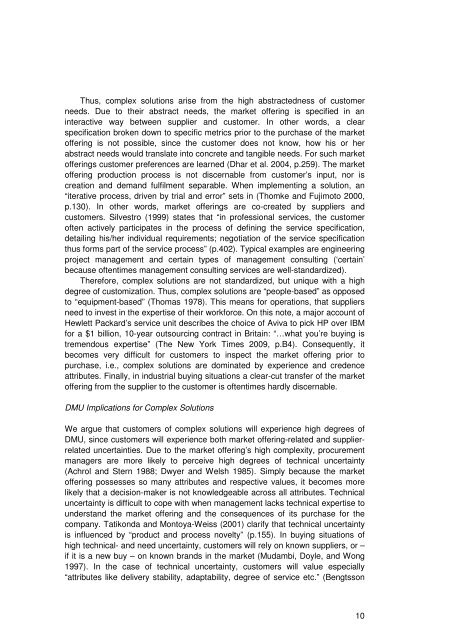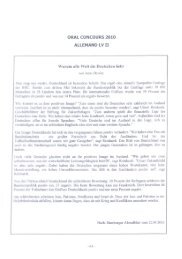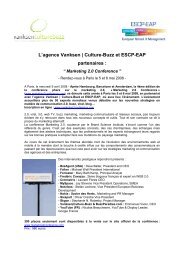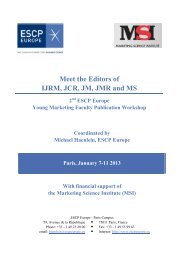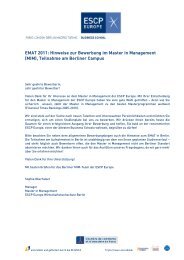WP 53_Jacob_neu - ESCP Europe Business School
WP 53_Jacob_neu - ESCP Europe Business School
WP 53_Jacob_neu - ESCP Europe Business School
You also want an ePaper? Increase the reach of your titles
YUMPU automatically turns print PDFs into web optimized ePapers that Google loves.
Thus, complex solutions arise from the high abstractedness of customer<br />
needs. Due to their abstract needs, the market offering is specified in an<br />
interactive way between supplier and customer. In other words, a clear<br />
specification broken down to specific metrics prior to the purchase of the market<br />
offering is not possible, since the customer does not know, how his or her<br />
abstract needs would translate into concrete and tangible needs. For such market<br />
offerings customer preferences are learned (Dhar et al. 2004, p.259). The market<br />
offering production process is not discernable from customer’s input, nor is<br />
creation and demand fulfilment separable. When implementing a solution, an<br />
“iterative process, driven by trial and error” sets in (Thomke and Fujimoto 2000,<br />
p.130). In other words, market offerings are co-created by suppliers and<br />
customers. Silvestro (1999) states that “in professional services, the customer<br />
often actively participates in the process of defining the service specification,<br />
detailing his/her individual requirements; negotiation of the service specification<br />
thus forms part of the service process” (p.402). Typical examples are engineering<br />
project management and certain types of management consulting (‘certain’<br />
because oftentimes management consulting services are well-standardized).<br />
Therefore, complex solutions are not standardized, but unique with a high<br />
degree of customization. Thus, complex solutions are “people-based” as opposed<br />
to “equipment-based” (Thomas 1978). This means for operations, that suppliers<br />
need to invest in the expertise of their workforce. On this note, a major account of<br />
Hewlett Packard’s service unit describes the choice of Aviva to pick HP over IBM<br />
for a $1 billion, 10-year outsourcing contract in Britain: “…what you’re buying is<br />
tremendous expertise” (The New York Times 2009, p.B4). Consequently, it<br />
becomes very difficult for customers to inspect the market offering prior to<br />
purchase, i.e., complex solutions are dominated by experience and credence<br />
attributes. Finally, in industrial buying situations a clear-cut transfer of the market<br />
offering from the supplier to the customer is oftentimes hardly discernable.<br />
DMU Implications for Complex Solutions<br />
We argue that customers of complex solutions will experience high degrees of<br />
DMU, since customers will experience both market offering-related and supplierrelated<br />
uncertainties. Due to the market offering’s high complexity, procurement<br />
managers are more likely to perceive high degrees of technical uncertainty<br />
(Achrol and Stern 1988; Dwyer and Welsh 1985). Simply because the market<br />
offering possesses so many attributes and respective values, it becomes more<br />
likely that a decision-maker is not knowledgeable across all attributes. Technical<br />
uncertainty is difficult to cope with when management lacks technical expertise to<br />
understand the market offering and the consequences of its purchase for the<br />
company. Tatikonda and Montoya-Weiss (2001) clarify that technical uncertainty<br />
is influenced by “product and process novelty” (p.155). In buying situations of<br />
high technical- and need uncertainty, customers will rely on known suppliers, or –<br />
if it is a new buy – on known brands in the market (Mudambi, Doyle, and Wong<br />
1997). In the case of technical uncertainty, customers will value especially<br />
“attributes like delivery stability, adaptability, degree of service etc.” (Bengtsson<br />
10


